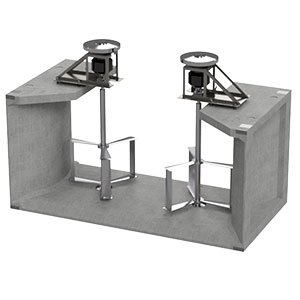
Two professors at the University of Tennessee, Knoxville, are contributing research to the Submarine Hydrokinetic and Riverine Kilo-megawatt Systems (SHARKS) program of the U.S. Department of Energy’s Advanced Research Projects Agency–Energy (ARPA-E) project. This project aims to speed up the process of making hydrokinetic turbine designs for tidal and riverine currents economically viable.
Hydroelectric power accounts for 6.6% of American energy production, and hydropower dams in the U.S. average more than 80 years old, according to a press release. Dams can cause environmental degradation of waterways and contribute to greenhouse gas emissions from the methane released by submerged vegetation, the university said. Yet, harnessing hydroelectric power in environmentally sustainable ways remains a critical part of the effort to decarbonize the electric grid.
DOE has granted 11 teams a total of $35 million to work to reduce the levelized cost of energy by incorporating experts in hydrodynamics, structural dynamics, control systems, power electronics, grid connections and performance optimization.
Orlando Rios, assistant professor in the Department of Materials Science and Engineering (MSE) in UT’s Tickle College of Engineering, and David Harper, professor with the Center for Renewable Carbon (CRC) in the UT Institute of Agriculture, are key members of the Emrgy Inc. team, which received $3.6 million through the program. Emrgy builds small modular flexible underwater turbines that can be scaled at high quantities and placed in waterways without modification of the existing infrastructure.
Power companies and manufacturers will be able to harvest the kinetic energy, or the movement of the water, instead of the potential energy that is harvested when a river is dammed. Harvesting kinetic energy requires far less infrastructure, but to make distributed products the cost of manufacturing must decrease. The other important factor is to make sure the materials are resistant to corrosion. This is why Emrgy is partnering with UT.
“We are thrilled to partner with UT’s MSE and CRC to advance Emrgy’s technical innovations, particularly in the material advancements related to long-life high-performance underwater systems,” said Emily Morris, Emrgy’s founder and chief executive officer.
Harper and Rios are trying to design the sustainable materials that will go into Emrgy’s kinetic turbine systems.
Emrgy already has blades designed for riverine water systems. The funding from ARPA-E will be focused on harvesting the energy from the rising and falling tides of brackish water. The research collaboration is focused on designing materials that will adapt to the water height with a telescoping design so the blades can become longer or shorter based on the tidal pool.
Rios is creating an aluminum alloy from recycled feedstock, where the main alloying element is a waste product of rare earth mines.
“The alloys we are working on don’t require heat treatment, so they are more energy efficient,” he said. “When you heat treat anything with a high aspect ratio — like a blade — it gets distorted, and then you have to straighten it, which costs money.”
Harper’s expertise is in lignin-based composites. Lignins are organic polymers that are important in the formation of nearly 25% of woody plant cell walls. Lignin is produced as a byproduct of pulp and paper manufacturing and is burned to produce energy. Not all of the lignin is burned, however, and fuel represents an important yet low-value use.
“We aim to take part of this abundant resource and produce more value for the forest products industry,” he said. “We are designing lignin-based and recycled carbon fiber composites to make a low-cost and more sustainable material.”
SHARKS is expected to span three years, with $38 million in funded projects.




